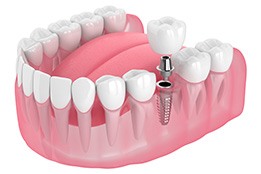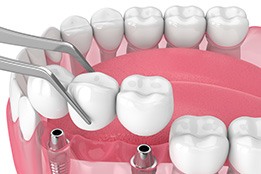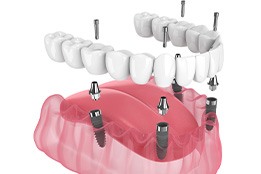Dental Implants Mercerville
A Modern Way to Rebuild Your Smile
Dental implants may not have been around as long as traditional dentures and bridges, but many dentists consider them to be the best option for replacing any number of missing teeth. Is there any empty space in your smile? Our team can help you figure out whether you are a candidate for dental implants or mini implants. Give our dental office a call if you would like to schedule a consultation with Dr. Lavery for dental implants in Mercerville.
Why Choose Dr. Brian Lavery Family and Cosmetic Dentistry for Dental Implants?
- Dental Implants Placed and Restored In-Office
- Mini Dental Implants Available
- Caring, Relaxing Dental Practice
What Are Dental Implants?

Unlike traditional bridges and dentures, dental implants are meant to be inserted into your jaw. Each implant post is made out of a biocompatible material that can gradually fuse with the surrounding bone tissue. Once your dental implants have become fully integrated with your jawbone, they can be restored with a customized crown, bridge, or denture. With the implant posts acting as artificial roots, your new smile will look great, feel comfortable, and function naturally.
The 4-Step Dental Implant Process

It typically requires several months to complete the process of having dental implants placed. Each step of the process will ultimately be worth it once you experience the advantages of implant-supported replacement teeth firsthand. The process as a whole can be divided into four main parts, and our team will walk you through every step of the way so that you know what to expect throughout the process.
Initial Dental Implant Consultation

Firstly, we’ll examine your mouth and review your oral health history to determine if dental implants are right for you. Sometimes you might require certain preliminary procedures before you can be considered a dental implant candidate. These could include services like gum disease treatment, bone grafting, or tooth extractions if there isn’t enough room in your mouth. Once you’re ready for the procedure, we can review what to expect from the entire process, including the timeframe and overall cost of your treatment.
Dental Implant Surgery

Unlike some practices, our team can perform the whole implant process in the office, meaning you won’t have to think about driving to separate locations. Placing dental implants in your jaw involves a relatively simple surgery. Of course, we’ll numb your mouth completely so that you don’t feel any pain or discomfort during your procedure. Dr. Lavery will then make small incisions in your gums to access the jawbone. Once the posts are in place, he’ll place protective caps atop the implants to aid with the healing process.
Dental Implant Osseointegration & Abutment

It will take 3 to 6 months for the dental implants to fuse with the jaw through a process known as osseointegration. This is when the titanium posts are properly held in place via your gum and connective tissues, providing an incredibly sturdy foundation for your new restoration(s). Once you’ve recovered completely, you will be ready to receive your abutments—tiny metal connectors that link your crown, bridge, or denture to your implants. You’ll then be sent home to heal from this appointment for the next several weeks while your final restoration is completed.
Delivery of Dental Implant Restoration(s)

Once your customized crown, bridge, or denture is ready, we can use the abutments to attach your new teeth to your implant posts. Dr. Lavery will also verify that your results and bite are correct and that you’re happy with your new pearly whites before sending you on your way. We’ll also provide you with aftercare guidelines so that you can make the most of your results for many years to come.
Benefits of Dental Implants

What’s the advantage of restoring your smile with dental implants instead of more traditional options, such as dentures? Because of their unique design, dental implants offer patients several unique benefits. To give you a better idea of how this breakthrough technology would impact you, we’ve put together a list of day-to-day, health, and long-term benefits that you could enjoy with dental implants. Give them a read-through, and don’t forget to call us if you have any questions!
Day-to-Day Benefits

You probably feel the effects of your missing teeth or dentures the most in your everyday life. Dental gaps can make it difficult to chew comfortably or speak clearly, and so can slippery dentures.
Since dental implants are anchored to your jawbone, you can trust that they’ll stay in place while you speak. This same design also allows them to retain 90% of your bite power – which basically means you’ll be able to eat most foods without issue!
Health Benefits

Did you know that when there are gaps in your smile, your jawbone actually starts to deteriorate? Normally, your dental roots would send sensory signals to your jawbone, essentially letting it know that it’s still needed for dental support. The lack of dental roots causes the bone to recede in pockets, which can lead to further tooth loss later in life.
Unfortunately, while dentures can slow down this process, they can’t fully prevent it from happening. Dental implants, however, can! The titanium posts connected to your jawbone are biocompatible, so the bone is more than happy to integrate with it. As of yet, they’re the only restoration that can effectively mimic dental roots.
Long-Term Benefits

As time goes on, you’ll still be able to enjoy all the benefits listed above. If you take good care of your dental implants with a consistent oral hygiene routine, you likely won’t even need to replace them for 30 years or more! That’s decades worth of good food, smooth talking, jawbone protection – and, of course, a seamless smile that looks and feels natural.
If you like to keep track of the math, you might have already realized that dental implants’ incredible longevity also saves you money in the long run. You would likely have to replace your dentures every five to seven years, and might require a few adjustments or repairs during that time. With dental implants, the only appointments you’re likely to need are biannual checkups and cleanings!
Who Dental Implants Can Help

Good news: dental implants are a great option for a wide range of patients – from those only missing one tooth to those missing all of their teeth. So, if you are struggling with tooth loss, don’t hesitate to schedule a consultation at our Mercerville office! In the meantime, you can learn a little more on the topic below, including what traits we look for in a good dental implant candidate.
Who Is a Good Candidate for Dental Implants?

As we mentioned above, dental implants can replace one missing tooth or an entire arch, which makes them quite versatile. At your consultation, Dr. Lavery will review your most recent X-rays, learn about your medical and dental history, and ask you a few questions about your smile goals and lifestyle. If your jawbone is strong enough to support a dental implant, you’re committed to good habits, like brushing consistently, and your gums are healthy, then there’s a good chance that you’ll be a candidate!
Missing One Tooth

If you are missing one tooth – even if it’s one of your molars, so you can’t tell when you smile – you should have it replaced. Otherwise, your surrounding teeth can begin to drift out of alignment, negatively impacting your bite in the process. If we determine that a dental implant is the best tooth-replacement option for you, then we will insert the post directly into your jawbone before attaching the custom restoration on top. The final result will be a complete, healthy, strong, and beautiful smile.
Missing Multiple Teeth

What if you are missing multiple teeth? In that case, we recommend an implant bridge! This tooth-replacement solution can replace several missing teeth in a row. Plus, your healthy teeth won’t have to be altered in the process. Since the entire restoration is custom-made with your face shape, dental needs, and smile goals in mind, it will look and feel completely natural.
Note: If you are missing multiple teeth throughout your mouth, then we may recommend several single implants or a partial implant denture – it really depends on your specific needs!
Missing All Teeth

If you are missing every tooth in an arch or all of your teeth, then Dr. Lavery will restore your smile with an implant denture! This requires as little as four implants, which are strategically placed throughout your mouth. Again, the denture will be custom-made for you, ensuring it doesn’t feel bulky or look unnatural in any way. One of the biggest perks of this tooth-replacement option is the lifespan; it can last for several decades with proper care.
Whether you recently lost a tooth or you’ve been struggling with tooth loss for years now, don’t hesitate to schedule a consultation with us so we can learn how we can help you!
Understanding the Cost of Dental Implants

Dental implants are one of the most celebrated methods of replacing teeth and are capable of doing incredible things for your smile. However, they’re also one of the pricier procedures available to you, which makes patients a little bit nervous about paying for the treatment.
While it’s absolutely the case that you get what you pay for, we still do everything we can to make your care as affordable as possible. If you’re curious, here’s what you should know about budgeting for the procedure and what it may ultimately cost.
Preliminary Treatments & Dental Implant Surgery

If you want strong dental implants you’ll need a solid foundation, which means that your gum and bone tissue will need to be healthy. If it isn’t, you may need a couple of preliminary procedures in order to prepare you for the treatment, like bone grafts or gum disease therapy. These treatments are important to consider when planning out your budget for the treatment.
Then there’s the cost of the procedure itself. You’ll have your treatment completed entirely in-house, which means that it’ll be possible to get a complete estimate for what it is going to cost beforehand.
The Parts of Your Dental Implant

The there’s the price of the dental implant itself, which comes down to several factors. As you can imagine, the number of dental implants you get will be important in this regard. You’ll also have to consider the type of restoration that you’re using, with dentures and bridge tending to cost more than dental crowns.
The material that the implant is made from, its size, and even the brand of the dental implant will be integral to its cost. We’ll talk you through all of these factors when we are able to meet you in person.
How Dental Implants Can Save You Money

Some patients are tempted to opt for one of the more inexpensive procedures, like dentures and dental bridges. While these treatments are absolutely incredible, dental implants can save you a lot of money in the long run if you decide to opt for them.
This is because dental implants regularly last over 30 years and can endure for a lifetime if you take care of them properly. This will save you a lot of money on replacements and give you the confidence of a much more durable tooth.
Does My Dental Insurance Cover Dental Implants?

Dental implants have surged in popularity in recent years; while they weren’t covered by insurance for a very long time, this is rapidly changing. For that reason it’s a good idea to reach out to your insurance company before the procedure to ensure that you’re getting the most out of your benefits. Of course, we’ll be happy to assist you in this process.
Making Dental Implants Affordable

We also want care to be affordable for patients who don’t have insurance, so we have alternative methods of making your care fit your budget. For one, we have an in-house dental plan that can give you substantial discounts on care, in addition to a host of other preventive services.
You may also be interested in financing. We frequently work with CareCredit, which offer low-to-no interest plans for patients who qualify. Give us a call and we’ll talk to you about what financial options are available to you at the time.
Dental Implant FAQs
How Long Do Dental Implants Last?
With excellent care, dental implants can last for more than thirty years, which is several times longer than the lifespan of traditional dentures and bridges. However, the lifespan of an implant largely depends on the patient’s health and habits. To help your implants last for as long as they can, stick to a daily oral hygiene regimen that includes brushing, flossing, and using antibacterial mouthwash while avoiding foods that are hard or sticky. It’s also important to refrain from using your teeth to open packages or bottles. Smoking will also make your implants more likely to fail.
Does Getting Dental Implants Hurt?
Before the dental implant placement procedure begins, Dr. Lavery will administer a local anesthetic to render the entire process painless, and the jawbone does not have many nerve endings in the first place. However, you may experience some soreness in your mouth for a few days afterward. This discomfort can be addressed with prescribed or over-the-counter pain relievers, but you may also want to try applying a cold compress. If the discomfort worsens after two or three days, please call our office.
What Can Cause Dental Implants to Fail?
While dental implant failure is uncommon, it is usually the result of peri-implantitis or failed osseointegration. Peri-implantitis is a type of gum disease that arises from poor oral hygiene, and it can loosen an implant by damaging the bone structure and gum tissue supporting it. Failed osseointegration occurs when the titanium post of an implant does not properly fuse with the bone structure of the jaw, and it is more likely if the patient has thin jawbones to begin with. Dental implant failure can also result from tobacco use, chronic teeth grinding, the side effects of certain medications, poor oral hygiene, the head or neck being exposed to radiation, and health conditions such as diabetes, cancer, osteoporosis, and autoimmune disorders. Dr. Lavery will provide you with guidelines that can help prevent implant failure.
What Should I Do if My Implant Feels Loose?
Your implant may be failing if you notice symptoms like severe pain around the implant, swollen or inflamed gums, changes in your bite, or the implant feeling loose to the touch. If you experience any of these issues, please notify Dr. Lavery as soon as possible, as they will only get worse without professional dental intervention. Whether your implant comes loose soon after being placed or after you have had it for a while, Dr. Lavery may be able to save it.

